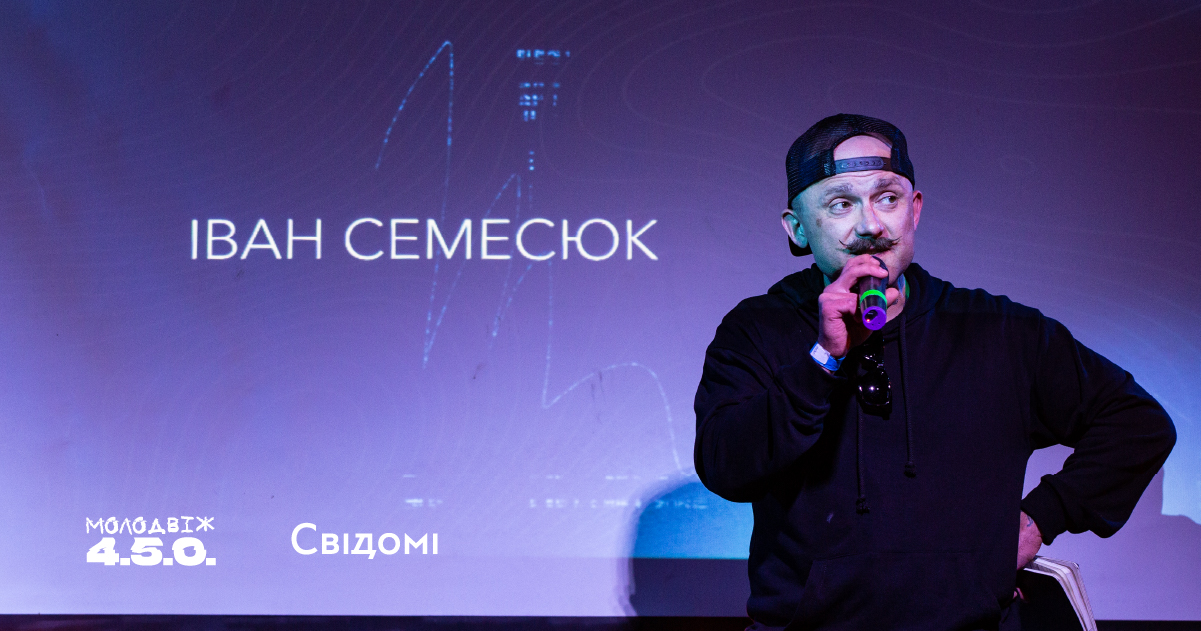Ukrainian identity and the metaphysics of freedom

On September 10, the All-Ukrainian youth event Molodvizh "4.5.0." was held in Lviv. As part of the event, an artist, musician, writer, author and host of the InstructionUA project, Ivan Semesiuk, spoke about what Ukrainian identity consists of, the role of individual freedom in it, and the global mission of Ukrainians. Swipe to read his lecture.
The components of Ukrainian identity
Historically, there were two countries where over 10 to 15% of the population belonged to the aristocratic class - Japan and the Polish-Lithuanian Commonwealth. Ukraine was part of the latter. In some areas, 25% of the population considered themselves nobility. This suggests that a particular aristocratic ideal has been circulating in Ukraine since ancient times. There is a myth that Ukrainians are a rustic, peasant nation, however we have many direct descendants of the aristocracy.
Ukraine is an urban civilisation. The villages of the Hetmanate were divided into Cossack and muhyr ("muhyr" - a simple, uncouth person). The corners of the villages were divided according to the professional principle. This structure is a remnant of the medieval urban division into workshops. What we often consider a Ukrainian village is an archetypal city. Not to mention Galicia, a civilisation of towns with market squares and town halls.
All the basic instincts that Ukrainians are guided by were laid down in the Middle Ages, in the era of the Grand Duchy of Lithuania. All the answers to why we are the way we are can be found in the Middle Ages. Therefore, this period should be introduced into mass culture.
It is essential to see ourselves through the eyes of the enemy and know what he calls us. This is how Ukraine should be viewed: Russians call us "conscious" and "independent".
Another critical piece of the puzzle of Ukrainian identity concerning the enemy's perception is the war. Therefore, it is worth comparing what Ukrainians and Russians say about the full-scale war in public discourse. Their important archetypes are "motherland" and "fatherland". Our cross-cutting theme is freedom.
Ukrainian society is more theocentric than Russian society. It would seem fundamental how the Russian Orthodox Church looks, but even a Russian is surprised that Ukrainians have crosses and icons. The category "God" and the category of freedom are in demand in Ukraine.
I came up with a formula where Ukraine is a temple with an altar of freedom. And in this sense, Ukraine is a manifestation of God, and the Armed Forces of Ukraine is a collective Archangel Michael.
The metaphysics of freedom
"What is freedom?" is the most important question. When we answer it, we will receive the answer to who we are and why we are in this world. Everyone knows the phrase: "Freedom is our religion". "Religion" is Latin for "connection". That is, "freedom" is our connection.
Ideal freedom is freedom from the tyranny of space and time. We all live within the measures of space and time. We talk about freedom, but even now, we do not feel free, meaning we delegate time to the future. Internally, we are constantly rushing somewhere, delegating our time, life and ideas to the future, which will be used not by us but by someone after us. We are continually taking steps into the future, but we never find ourselves there because we are present here and now.
For Ukrainians, the axis of identity is individual freedom - it is the basis of the foundations, and it is more important than language or culture. For many European nations, the axis of identity is a guarantee - a “warm water pink enema” and the belief that everything will be fine. Ukrainians do not need a pink enema; Ukrainians need toughness because freedom is the absence of guarantees.
So what to do with it?
There is such a thing called Ukrainian culture. Ukraine and its culture exist to manifest and preach the category of individual freedom. I believe that Ukraine is the key to the future. The key to opening the door to the future.
The more Ukrainians think about individual freedom, the more chances humanity will have to get into the future. We are responsible not only for ourselves but for humanity too.


